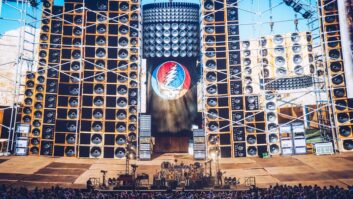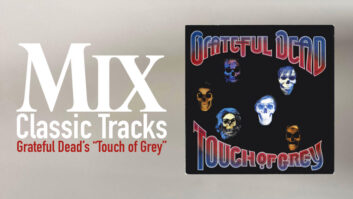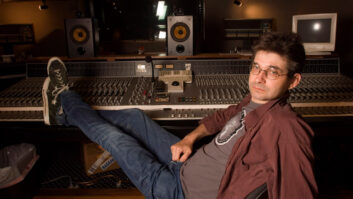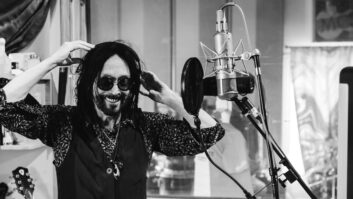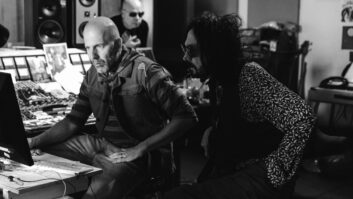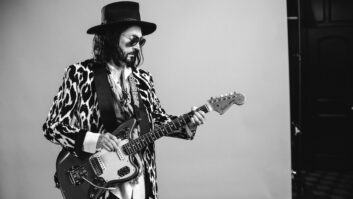
Mike Denneen, an influential producer, engineer, and co-founder of Q Division Studios who worked with artists including Aimee Mann, Fountains of Wayne, Guster, Morphine, the Click Five, Gigolo Aunts and Letters to Cleo, died of cancer on July 10. He was 54.
“He was a sort of music director at his core,” said Jon Lupfer, Q Division’s co-founder and Denneen’s longtime business and creative partner. “He had that gene for organizing other people and hearing past his own stuff into how to make parts work together, listening to records deeply, trying to work out not only what he was doing but what everybody was doing. Mike had a good sense for what was important and what wasn’t.”
Denneen and Lupfer met in a jazz improvisation class at Milton Academy in Milton, Mass. While still in high school, they recorded and produced their group, Busload of Nuns, in the basement of Denneen’s parents’ house in Quincy, Mass. “The equipment we were using and the way we were making it work probably made the record suffer,” Lupfer remembered, “but from the point of view of a learning experience, it was probably really good.”
“At that point, Mike was quite sure he was going into music,” said his brother, Bill Denneen. “The only question was in a band or recording.”
“We had talked about doing music,” said Lupfer. “The studio kind of seemed like where the action was.”
Upon graduating from college in 1986, Denneen and Lupfer founded Q Division in a warehouse in Boston’s South End, which “was not hip at all,” Lupfer said, but centrally located among Boston’s thriving indie music scene. “We were subletting from a basket importing company,” he said. “The craziness of building a studio in not just a rental but a sublet was like, ‘Are you kidding me?’ But it was cheap, and the building had other artists in it, there were people living in the building.” It was the kind of environment “that doesn’t exist in Boston or Cambridge anymore, that engender artist communities.”
Q Division’s founders “had to build out the space themselves,” Bill Denneen said. “They had no money to hire professionals, so they rounded up friends and musicians, people they could find who had some level of skill, and traded studio time for labor. I was one of them.”
“We were pretty much content to work for any amount that it took,” Lupfer said. “And we were going out to see shows whenever we weren’t in the studios. You make friends with the people your age who are going to shows. It fed on itself.”
The “guerilla” feel of Q Division’s early years worked in its favor, he said. “The dominant studio vibe was like, ‘We’re super high-tech, very professional,’ and our attitude was, ‘We’re like you. Come in and hang out and have fun and work.’ It wasn’t precious at all, but good enough.”
By 2000, the studio had built a reputation and credits sufficient to move to its present space in Somerville, a two-room studio featuring the Neve 8068 Mark I-equipped Studio A and Studio B, which houses a Solid State Logic XL-Desk.
Among Denneen’s credits as engineer, producer, or both are Fountains of Wayne’s Utopia Parkway and Welcome Interstate Managers, the latter which featured the hit “Stacy’s Mom;” Mann’s Lost in Space, Bachelor No. 2 Or, the Last Remains of the Dodo, and I’m With Stupid, featuring the hit “That’s Just What You Are;” Gigolo Aunts’ Minor Chords and Major Themes; Howie Day’s Australia; and Season of Rain and Little Steps by Merrie Amsterburg.
“A lot of people loved him,” Lupfer said of the artists Denneen produced and recorded. “It wasn’t just, ‘We worked with that guy.’”
Michael Denneen was born on August 27, 1963, in Boston. He grew up in Quincy, in the house where his parents still live. In addition to his parents and brother Bill Denneen, he is survived by his wife, the recording artist Jen Trynin, and their daughter, Gracie. Two other brothers, Mark Denneen and Jeff Denneen, also survive.
Upon his passing, the Paradise, a renowned Boston music venue, posted a remembrance on its marquee. A diehard fan of the Boston Red Sox, Denneen was honored by the team, which played his music between innings upon his passing.
Brian Rosenworcel of Guster posted a moving tribute to Denneen on Instagram in which he recalled working with the producer while he and his bandmates were was still in college. “Mike was a beacon,” he wrote. “He was a father figure. We trusted him. He took the time to record between midnight and 6 a.m. with a bunch of aimless college kids with acoustic instruments and harmonies. He brought real musicians into our orbit, and he even let us bring our Tufts friends out to play violin solos.”
Q Division will continue, Lupfer said. “That will be a question for another day, but we’re still here,” he said. “We’re doing okay.”
